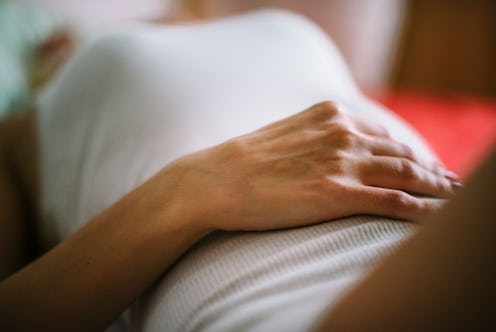Life
If You Recognise These 5 Symptoms, Your Period Pain Might Actually Be Endometriosis

According to the Guardian, 1 in 10 people who menstruate develop endometriosis once they reach reproductive age, yet patients often don't receive the treatment they require. Noticing any of the symptoms of endometriosis listed below? Don't hesitate to see a GP and express your concerns.
"It takes an average of seven to eight years to be diagnosed with endometriosis," the Guardian reports, citing new endometriosis guidelines from the National Institute for Health and Care Excellence. Many patients “are told they are making a fuss about normal period pain," the newspaper continues.
So what exactly is endometriosis? The NHS explains that it's "a condition where the tissue that lines the womb (endometrium) is found outside the womb, such as in the ovaries and fallopian tubes." The Guardian notes that this tissue can also grow in the abdomen, recto-vaginal septum, bladder, and bowel; what's more, it "behaves like the lining of the womb, bleeding every month, and can cause cause severe and chronic pain." Basically, it's a severe and often debilitating condition — and it's all too often minimised or missed.
It's vital that people with endometriosis get the treatment they deserve, and don't continue to suffer in silence. Take a look at the common symptoms listed below, and make an appointment with your doctor if any sound familiar. And remember: your health is important, and you are worthy of treatment.
1Your Periods Are Painful And Heavy
Period pain and heavy flow, two symptoms listed by the Mayo Clinic, are tricky ones to figure out — after all, how can you tell whether it's endometriosis or just a bad period? The NHS recommends seeing a doctor if the pain "stops you doing your normal activities", while Emma Cox of Endometriosis UK told Cosmopolitan that pain throughout the month can also be a red flag. "Endometriosis may cause scar tissue, or be affecting organs or nerves, and so result in very regular pain," Cox explains. Don't assume, however, that only experiencing mild pain precludes a diagnosis. Some people with mild endometriosis “have intense pain, while others with advanced endometriosis may have little pain or even no pain at all," the Mayo Clinic explains.
2You Experience Other Symptoms During Your Period
According to the Mayo Clinic, these can include "fatigue, diarrhea, constipation, bloating, or nausea," plus you might also experience pain or discomfort when using the bathroom. Again, these are issues commonly associated with menstruation — but it's worth seeing your GP to be sure, especially if you're experiencing other potential symptoms of endometriosis.
3You Experience Pain In Other Parts Of Your Body
The NHS says that "pain in your lower tummy or back", that's typically worse during your period, could be a sign of endometriosis. But Emma Cox of Endometriosis UK explains in Cosmopolitan that the disorder isn't just limited to the pelvic area, and can also be found in the liver, lungs, and even the brain. "That means that pain can occur in different places, and it will be different for each sufferer," Cox says.
4It Hurts To Have Sex
Painful sex, or dyspareunia, is a common symptom of endometriosis, according to Medical News Today. "Penetration and other movements related to intercourse can pull and stretch endometrial tissue, particularly if it has grown behind the vagina or lower uterus," the site explains. See your doctor if you're concerned — and try not to despair, because endometriosis doesn't necessitate painful sex. Heathline suggests several adjustments to make sex more comfortable, including switching positions, using lube, and having sex at particular times of the month.
5You're Struggling To Get Pregnant
The NHS lists "difficulty getting pregnant" as a symptom of endometriosis; in fact, according to the Mayo Clinic, this is how many people discover they have the condition. It's not impossible to get pregnant after an endometriosis diagnosis, however; the NHS says, "Surgery to remove endometriosis tissue can help improve your chances of getting pregnant." If you're having fertility issues, take them to your GP.
6
Suspect you might have endometriosis? Don't hesitate to make an appointment with your doctor. While it can be a painful and distressing condition, the NHS lists several potential treatments to alleviate the symptoms, from painkillers and hormonal contraceptives to surgery. It's not something you should quietly put up with; instead, make the first step towards getting better and speak to your GP.